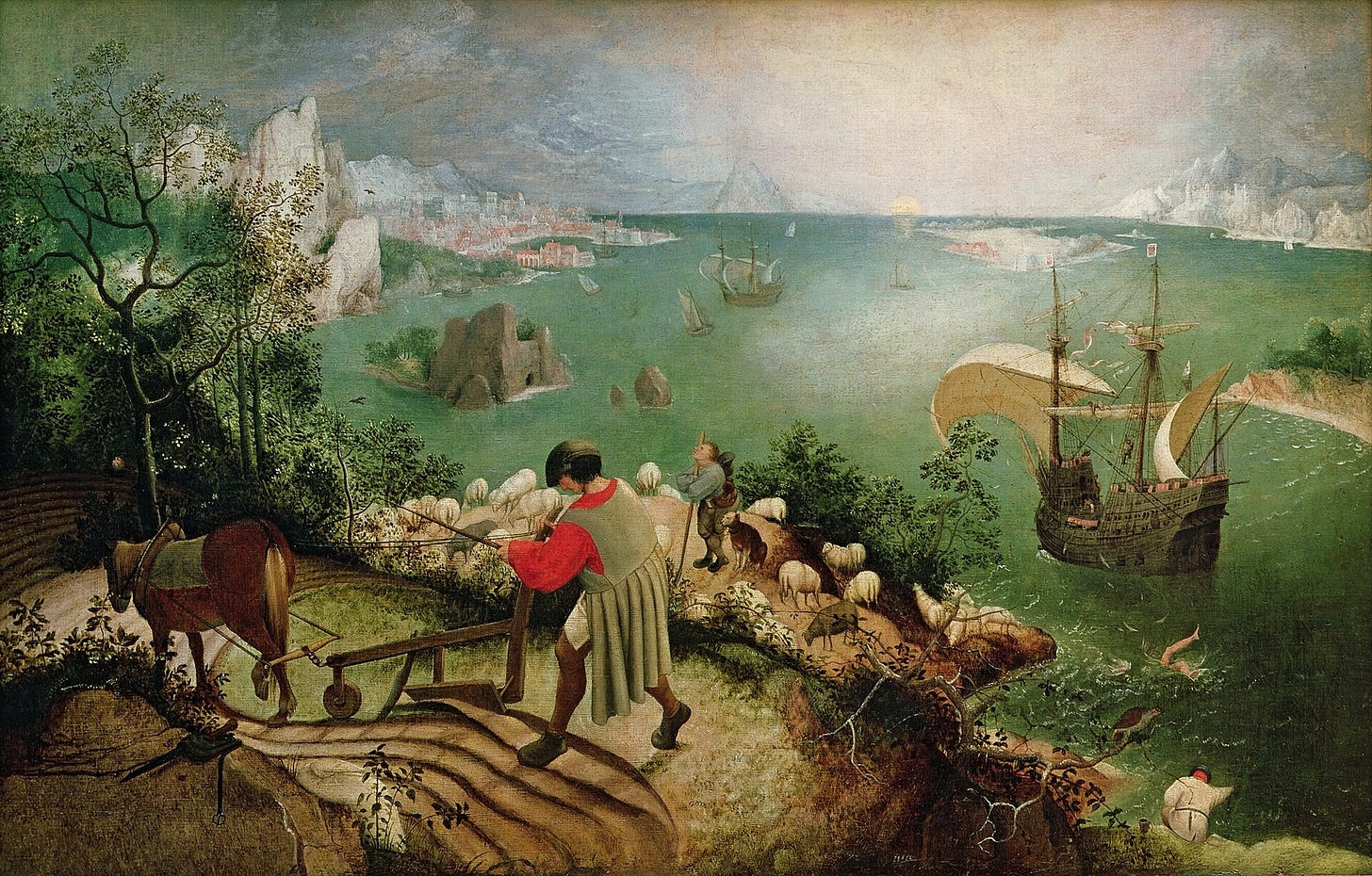Cold Logic
Splashing around in the heat of the moment.
Sometimes, I fall into rivers.
I live on a boat in a marina where falling into water is a recognised hazard along with wind, battery fires, and upsetting a swan. I have life jackets under my sofa. They look old.
The first time I fell in a river, I lived in a house. It was a little over twenty year ago. I was fifteen, on a scouts trip to Switzerland (surprise home of scouting), walking along a bridge that stood about a metre above the water. The bridge had two slight left turns and zero railings. On a high from successfully turning slightly left once, I strode in a confident straight line right over the second turn, and slap-bang-splash into the water.
I do not remember what happened next. I probably showered.
The second time was five years ago when I’d only recently started living on boats. It was only a partial dunking. I was trying to get into my home but was distracted by a conversation with a passing electrician. As I stepped forward but my focus stayed behind me, I misjudged the distance from jetty to boat and attempted to stand my right leg on the Thames. It went all the way to the hip before I was able to stop any more of me from joining in.
I am pretty confident that I then took a shower, and also washed my trousers.
The third time was at 10 PM on 16 July 2021. I now lived on a different boat, a Dutch barge which was parked alongside the jetty. I got on and off through a wooden sliding door. It was dark and warm and I was full of beans when I sprang outside. As before, I misjudged where my foot should go in the whole water/jetty situation. This time, the leg did drag the rest of me in and I was fully underwater in what I was once assured is the third cleanest major river in Europe.
So, there I am, in the Thames, absolutely delighted that I left my phone behind and equally livid that around my neck I am wearing a pair of quite nice wireless headphones.
The job is to grab the jetty and climb out.
Fine.
Or not. The water in my marina is reasonably deep. Legend has it there’s a bus down there. It turned out that getting hold of the jetty without a floor to stand on was a problem. I was surprised because the jetty is not that far above the waterline and, from a pedestrian looking down perspective, an easy shelf to reach for if you ever fall in. Even with the lack of ground, if I could just lean one arm on some kind of surface it would have been very easy to reach up and pull myself up with the other hand. And this is what I tried to do.
The Thames remained surfaceless.
After I tried this lean-and-reach strategy a couple of times, you might think I’d go and look for another. I can, at the end of the day, swim. But no. I found myself over and over repeating the same action - trying to get some kind of purchase on water so that I could pull myself up to land, preferably before the current changed and my boat closed the gap between where it was bobbing and the jetty I was reaching for. Remember, I’m between the two, not in open water, and in any upcoming battle between boat and bones, I wouldn’t bet heavily on my skeleton.
Perhaps I could call for help. On the other hand, it is deeply ingrained in me not to cause a fuss, so that option was right out.
There I am, mindlessly repeating these actions - extend elbow like this to lean on the river and then I’ll be able to reach like that… and a little part of my head kicks into helicopter mode and starts monitoring what I’m thinking in what is increasingly seeming like a high stakes situation - the kind that happens in fiction but not, generally speaking, my life.
Am I worrying about being squashed? Am I trying to figure just how many times I can make starjump motions in a moving body of water and kick my legs to keep afloat without getting tired? Have I worked out that there are ladders around the marina for exactly this eventuality and if I take a second to think about it I can quite easily get out?
If I were a character and we were to believe the strict what’s-my-motivation approach to all this, you’d think those thoughts would be dropping into my head one after the other and whizzing around to create lovely high-stakes smoothie that would inform my next line1. But my thoughts do not come pre-installed with Powerpoint. All of this other stuff was either obvious to me and therefore not worth thinking about (we might label them given circumstances) or eclipsed by my actual train of thought. This seesawed between two points:
This water is annoying.
Does rice work on headphones?
The longer I was there, the quicker I tried to repeat the gestures. Perhaps I thought if I did them with enough energy, the river would obligingly turn into a trampoline. I certainly thought that the river was at fault and not pulling its weight. I had the feeling of being absorbed in a video game, watching Sonic crash into spikes and lose all his rings - a feeling of increasing irritation.
Happily, after what seemed like a long time but was probably no more than a minute or two, a heroic neighbour who’d heard the splash fished me out. My frustration at the concept of liquid dissipated and was replaced with a chuckling ‘this is all very jolly’ kind of gratitude. I’d had an adventure!
Over time, this experince has been very useful to think about.
Any Plan Will Do
When we meet characters in text, we are going to find them at moments of high stakes. Nobody writes the story of how King Lear browsed eBay for a cheap Stratego set. Drama is worlds collapsing2.
If you’ve had any uncertainty in your life, you might recognise the feeling of relief when a plan comes along. Even if it’s a bad plan, it is at least something. It gives you action. The fear and upset and panic is oftentimes the product of a vacuum, it is what happens when there is no plan. As I type this, I have the image of Tom Cruise in my head in one of the more recent Mission Impossible films. He's running along rooftops on the Southbank in London, leading to a confrontation with Henry Cavill at the Tate Modern. The stakes are suitably Tom Cruisey. He is not panicking. He has a plan. The plan is to run. Therefore: he runs.
I used to imagine that when you get to a dramatic crunch point, all there was to do was wave your arms and shout in an upset manner. My head would fill with white noise as I tried to find the correct impulse. If I imagine a search and rescue pilot saving a trapped mountaineer, part of me expects the mountaineer to be in a bubble of panic, completely tuned out of their senses, eclipsed by the white heat of AAAAAAAAAAAAAAAAAAAAAAAAAAAAAAAAAAAAAAAAAAAAAAAAAH.
More likely, that mountaineer is hard at work on one singular crystalline plan. They have to complete it. There are no breaks. If they could just shift this rock they could free the rope and then it will all be OK and all of this is pretty silly and annoying and the frustrating thing is they’re going to have to buy new rope and they’re already in the outdoors shop all the time and it’s getting a awkward that the staff know them by name but they’re just once again going to try to shift this rock so they can free the rope and… you get the idea.
The brain seems to go at double speed, all extraneous considerations gone because they’re not useful.
When Lear is on the heath, he is not despairing. He rages challenges at the weather and carries on until he finds the cave. Things are dire but he’s on what he can do about it. There will be time for despair later, notably when he holds the body of Cordelia in his arms. For now things are bad but not everything’s been tried so he puts one foot in front of the other until he can’t anymore.
In the moment, we are logic machines. Even if the logic is flawed.
After the moment though…
Aftermath
The Wim Hof method is the one that suggests you have a cold bath or shower every day for thirty days. Supposedly once you get past the initial unpleasantness, you end up craving the cold water and it’s awfully good for you because of, erm, science probably. It pops up in articles every few years and gets written about with the same adjectives as yoghurt.
In the later summer of 2021, I decided to try the Wim Hof method. I had sort of wanted to for a while and for some reason now seemed like the perfect time to try. For thirty days in August and September, dubious but open minded, I had a cold shower in the morning. I was ready to fall in love with cold water.
And you know what?
You bloody know what?
…
It’s awful. I hate cold showers. I hate hate hate them they’re the worst. Who does that for thirty days it’s ridiculous.
It has been suggested to me that my decision to give the Wim Hof method a go was some sort of subconscious way of forging a new relationship with being drenched in cold water. Perhaps it’s coincidence, perhaps it’s not. What I do think is true is that all those white heat AAAAAAH moments come after the high stakes incident, not during.
If our minds, while it is happening, become powerful logic factories working on resolving the problem and nothing else, the clouds of fear and uncertainty and general fog belong to the aftermath. Hamlet prevaricates and spins out after his father’s death. Lady Macbeth sleepwalks and dreams after her husband murders Duncan. Iago, moments after Othello dies, refuses to speak again.
When in high stakes situations, I think it can be helpful to think of our characters as purposeful rather than terrified. There will be time for the mind to tie itself in knots later as we replay and ruminate and lose that clarity of purpose, for small noises to scare us out of our wits (think of the owl in Macbeth) or for the everyday vacuum of life to fill with maudlin recrimination (shout out to Uncle Vanya). But when your character is burning in the heat of the moment, see if you can find them some freezing cold logic.
‘This is rubbish.’
‘Drama’ here includes comedy. Friends begins with Rachel abandoning her wedding.




